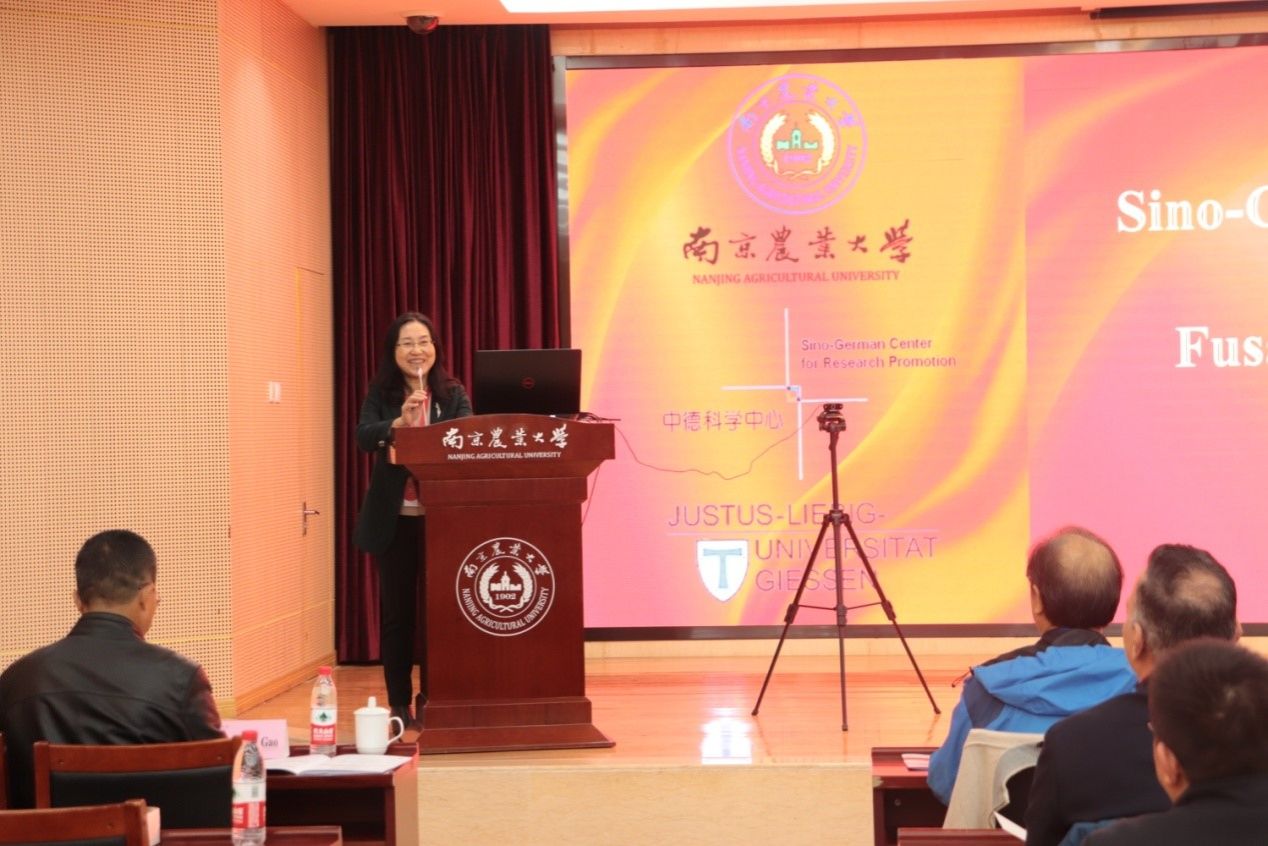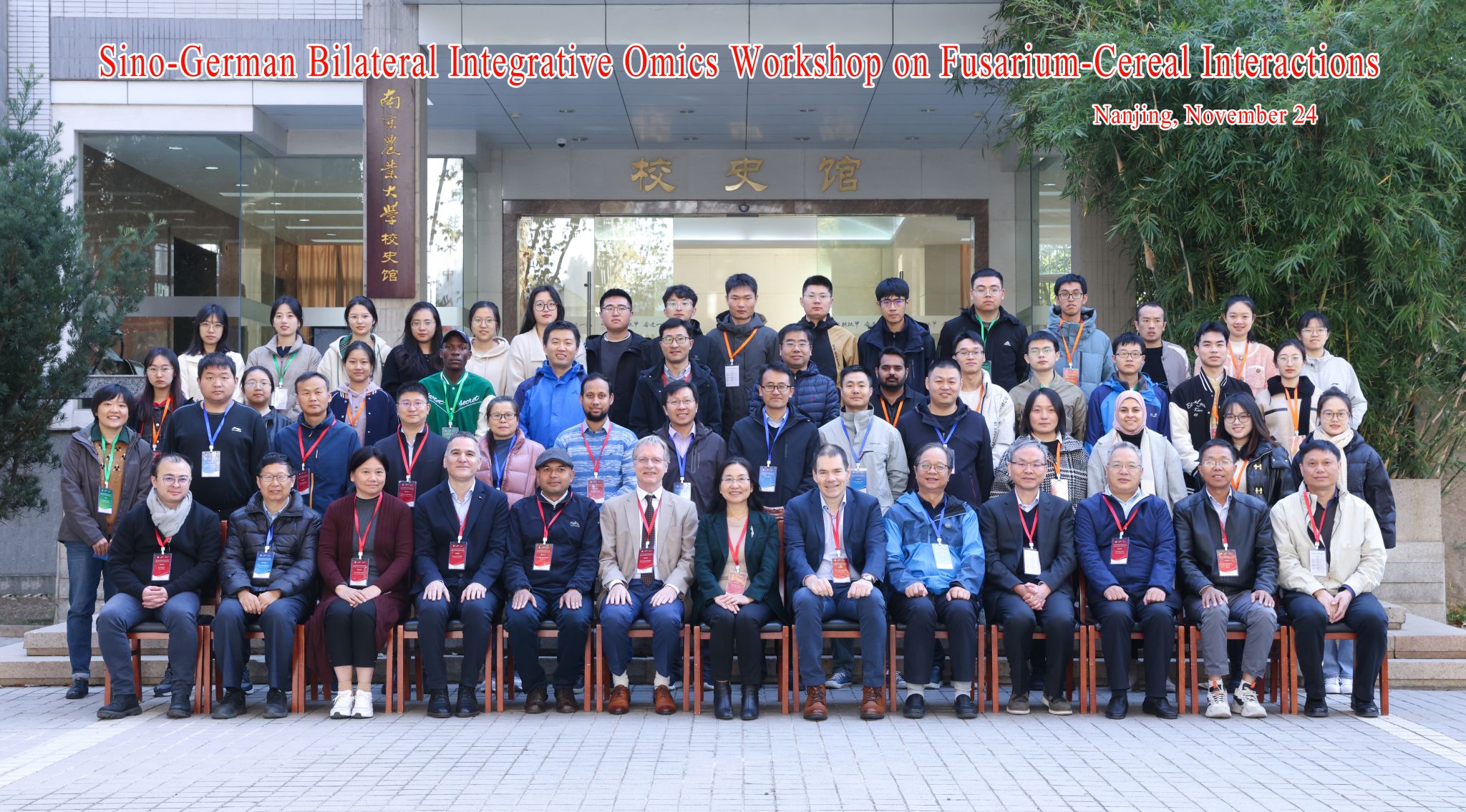2023年11月23至26日,“中德禾谷类作物-镰刀菌互作整合组学双边研讨会”在南京召开。会议受中德科学基金研究中心资助,由南京农业大学和德国吉森大学共同主办。此次会议旨在展示中德科学家在禾谷类作物-镰刀菌互作方面的最新研究成果,推动整合组学(基因组、转录组、代谢组,表观组及蛋白质组等)前沿技术在作物-病原菌互作研究中的综合应用,加强中德科学家在多领域、多层次的深入交流与合作。
会议邀请到了德国吉森大学、马克斯-普朗克研究所、联邦德国栽培作物研究中心(JKI)、波恩大学、科隆大学和美国橡树林实验室的多位外方科学家,以及中国农业大学、中科院卓越植物研究中心、浙江大学、河南农业大学、福建农林、扬州大学和南京农业大学等本领域的多位科学家到会做特邀专题报告。会议围绕“利用组学技术解析禾谷类作物-镰刀菌互作机制”、“整合组学技术在作物-病原菌互作研究中的应用”、“镰刀菌基因组、致病力及防控”“整合组学技术平台的构建及其在作物改良和育种中的应用”、“禾谷类作物重要抗病性状的基因组分析和遗传基础”5个议题展开,会议期间共有23场精彩的学术报告呈现,共有70余名来自中外多家高校和研究所的师生参会并进行了充分深入的交流。
开幕式上,南京农业大学中国-肯尼亚作物分子生物学“一带一路”联合实验室主任及作物遗传与种质创新利用全国重点实验室副主任王秀娥教授,德国吉森大学无机与分析化学所Bernhard Spengler教授分别作为中、德代表致欢迎词。闭幕式由高夕全教授和Bernhard Spengler教授共同主持。
会议期间,中、外代表及参会师生进行了充分的交流,开拓了视野和思路,对会上接触到的最新研究技术和研究成果表达了浓厚的兴趣。部分中、外教授和学者还就共同研究的课题达成了今后进一步合作的意愿和方向。
“Sino-German Bilateral Integrative Omics Workshop on Fusarium-Cereal Interactions” was convened in Nanjing China
“Sino-German Bilateral Integrative Omics Workshop on Fusarium-Cereal Interactions” was held on November 23rd-26th 2023, at Nanjing Agricultural University, Nanjing, P. R. China. This workshop is founded by Sino-German Center for Research Promotion and co-organized by Nanjing Agricultural University, China and Justus Liebig University Giessen, Germany. The meeting aims at building up a closer connection between scientists from but not limited to these two countries, to gain in-depth knowledge of cereal-Fusarium interactions, and to expend the utility of cutting-edge omics technology in related fields, and eventually to foster future collaborations.
This meeting invited eight German scientists from Justus Liebig University Giessen, Max Planck Institute, Julius Kuehn-Institute (JKI)-Federal Research Centre for Cultivated Plants, University of Cologne and University of Bonn, and one scientist from Oak Ridge National Laboratory;and thirteen Chinese scientists from China Agricultural University, Nanjing Agricultural University, Henan Agricultural University, CAS Center for Excellence in Molecular Plant Sciences, Zhejiang University, Fujian Agriculture And Forestry University and Yangzhou University. There were 23 presentations in related topics: the recent Fusarium-cereals interaction research progress; the potential utility of MSI in the area of plant-pathogen interaction; Fusarium genome, pathogenicity and management; the cutting-edge technologies and their applications in crop-pathogen interactions; molecular and genetic mechanisms underlying Fusarium disease resistance by using integrative-omics technologies. There were more than 70 scientists from domestic and aboard attended the meeting.
On behalf of Chinese and German university, Professor Xiue Wang the director of the China-Kenya “Belt and Road” Joint Lab of Crop Molecular Biology and vice director of state key laboratory of crop genetics & germplasm enhancement and utilization in Nanjing Agricultural University, and Professor Bernhard Spengler from Justus Liebig University Giessen addressed opening remarks. Prof. Xiquan Gao and Prof. Bernhard Spengler co-hosted the closing remarks.


